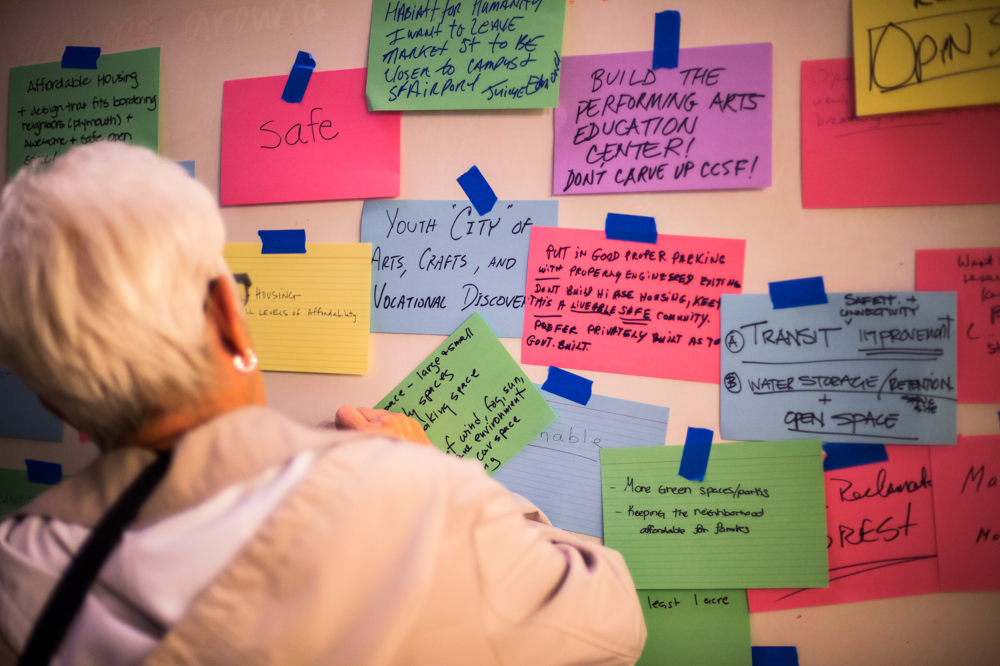Balboa Reservoir residents rebel against development

By Otto Pippenger
The Guardsman
On Wednesday Jan. 21, Community members gathered to discuss the future development of the Balboa Reservoir.
Representatives from San Francisco Planning, the SF Public Utilities Commission, and the Office of Economic and Workforce Development invited public input regarding the local implementation of Mayor Lee’s Public Land for Housing program in the Balboa Reservoir which is one of five pilot locations.
The meeting’s purpose was to “Understand community priorities” on the seventeen acre lower lot of the Balboa Reservoir, owned by the San Francisco Public Utilities Commission but currently used as parking at City College’s Ocean Campus. As part of the continuing 2009 Balboa Park Area Plan, the reservoir is under strong consideration to be sold by the SF Public Utilities Commission to create housing by a Private Developer yet to be determined.
As the doors opened at Lick Wilmerding High School that evening, more than 120 citizens filled the school’s spacious cafeteria. Members from the pro developments SF Bay Area Renter’s Federation, angry City College teachers, and various environmental groups all arrived in force to make certain that their positions were taken into consideration.
After the crowd circulated around prospective maps of possible areas for change, the lights were dimmed and a fifteen minute presentation by SF Planning members began.
Planning/Process official Jeremy Shaw explained that the current goal for the area was to develop midincome housing in the next few years, saying “middle income (housing) is what is in our sights. A developer will be chosen based partially on input from the meeting, with a design slated for 20162017 and construction beginning thereafter.”
The meeting turned contentious before the presentation had even finished. As Shaw said “everything you write down tonight will be compiled to become the basis of our plans” City College Biology Professor Simon Hansen interrupted from within the crowd, saying “what if our input is that we don’t want it developed?”
Crowd members were repeatedly told “there is no design or proposal on the table tonight.”
Nevertheless, presenters continued to outline a timetable of prospective development at the end of the ten month public input phase.
As one attendee said “it seems like a done deal and that angers me.”
After the presentation, the city representatives each took a table full of attendees and asked them to rate their priorities according to a checklist provided, which included “open spaces” “affordable housing for all income levels” “housing for local workforce” “parking” and “public art.” Throughout the room questions were asked about the definition of “affordable housing,” transit and sewage considerations, the future of City College’s parking, the CCSF Performing Art’s Center, and many other elements.
The prospective price of the housing was a frequent question that went largely unanswered. Though one official offered “less than 30% of your income annually” as a definition, there was no clear answer to “what affordable housing for all income levels” literally meant, whether the constructions would offer mixed unit types or not, or how many occupants any construction would be intended to accommodate.
One of the most consistent question of the dissenters was what would become of City College’s space and parking though only the western 17 acres owned by the SFPUC were up for sale, City College owns the eastern ten, and uses all 27 for parking, while the Performing Art’s Center is already slated to be built on the CCSF land. “Where do you plan on putting all of CCSF’s cars?” asked one woman.
A number of priorities emerged as presenters summarized their group’s desires. Concerns about the influx of new people on transit and utilities systems, a desire for open spaces, and for affordable housing were all heard. One summary was interrupted by local Gabriel Medina, who cut off the speaker to say “our group is not proposing development. Our group wanted something that worked with City College and its commuters.”
After a strong mandate against development, it remains to be seen whether or not plans will be changed. As community member Adrienne Go said, “A private developer means more than open space.”

Comments are closed.